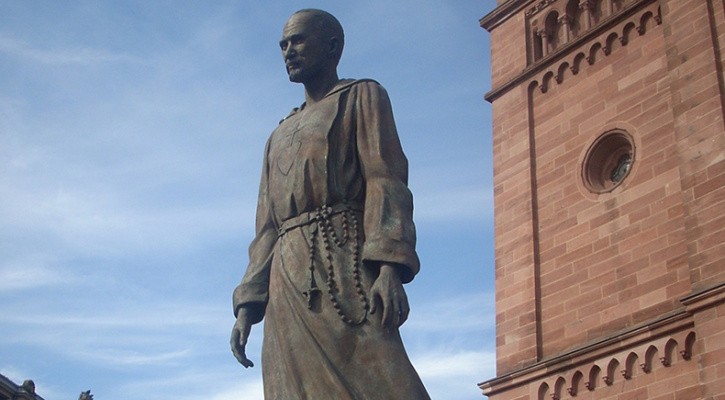Notebook
At the very end of Pope Francis’ recent encyclical, Fratelli Tutti, a name appears, perhaps unfamiliar to many Catholics here in Ireland: Blessed Charles de Foucauld [pictured]. The Pope describes this desert-hermit as “the universal brother”, who had surrendered himself entirely to God in order to become “a brother to ever human being”.
But who was he, and how did he end up living deep in the Sahara?
Charles was born into a very wealthy French family, with an ancestry full of military heroes.
The idyll of his early childhood was brought to an abrupt end by the deaths of his parents when he was six years old. Cared for by relatives, he grew to be a charmingly cheeky boy, and continued to pray as his mother had taught him. As a teenager, though, he found himself drifting from God. During his young adulthood, as he later explained, he “spent years denying nothing and believing nothing”.
Apathy
In this state of spiritual apathy he drifted into the French military, with little ambition for anything other than sensual pleasure. He had a string of sexual relationships, and brought to new levels the French capacity for gastronomic delight. One of his colleagues in the officers’ training college wrote of young Charles: “If you have not seen Foucauld in his room, clad in his white flannel pyjamas buttoned with frogs, sprawled leisurely on his divan, enjoying foie gras and washing it down with a choice champagne, then you have never see a man really enjoying himself.”
But Foucauld wasn’t really enjoying himself. The wilder the parties got, the more he felt empty when he returned to reality.
What changed things for him was a map-making trip to Morocco, shortly after he left the army. During his 11 months of travel, Charles was deeply moved by the example of the local Muslims. Seeing them pray woke him from his spiritual slumber, and made him realise, as he later explained, that “there is something greater and more real than the pleasures of this world”.
In the wide open spaces of the desert at night, Charles had the strong sense that “all of creation bows down humbly before its Creator”. He was ready to give himself to the search for God.
There in the desert, until his death in 1916, he celebrated Mass daily”
On return to Paris he went to visit a priest, well known as a spiritual director. Charles was hoping for long conversations with the priest about the truth, or otherwise, of the Catholic Faith, but the priest, recognising Charles’ spiritual openness, simply invited him to make his confession and to receive communion. Charles had returned to the Lord’s brotherhood.
He had a great desire, though, to go further, to give himself completely to the Lord, to abandon himself entirely to him. First he entered the Cistercian life, then he worked for seven years as a handyman for the Poor Clares in Nazareth, imitating the hidden life of Jesus. Finally, he was ordained priest and became a missionary in the Sahara, with a new vision of Christian mission, based on the hiddenness of Jesus. Charles lived in a tiny oasis, hundreds of miles from anywhere, in the presence of a few dozen families (all Muslim).
There in the desert, until his death in 1916, he celebrated Mass daily, he adored the Lord in the Eucharist, and he loved his neighbours with a universal, brotherly love.
Journey
We in Ireland don’t need to journey to the Sahara to find those who do not know the love of Jesus. As secularisation continues, we find ourselves in a rapidly expanding spiritual desert. This unsettles us, and we sometimes feel unsure how to react. Blessed Charles is a radiant reminder that, whatever we face, whatever battles we must fight, there is one thing necessary: to seek the Lord’s face, to sit at his feet in prayer, to receive the gift of his brotherhood.
Then, and only then, will we be ready to share this brotherhood with all the desert-dwellers we meet, who long for family and a home.
A prayer of Blessed Charles de Foucauld
Father, I abandon myself into your hands; do with me what you will.
Whatever you may do, I thank you:
I am ready for all, I accept all.
Let only your will be done in me, and in all your creatures.
I wish no more than this, O Lord.
Into your hands I commend my soul;
I offer it to you
with all the love of my heart,
for I love you, Lord,
and so need to give myself,
to surrender myself into your hands,
without reserve,
and with boundless confidence,
for you are my Father.


 Blessed Charles de Foucald
Blessed Charles de Foucald 